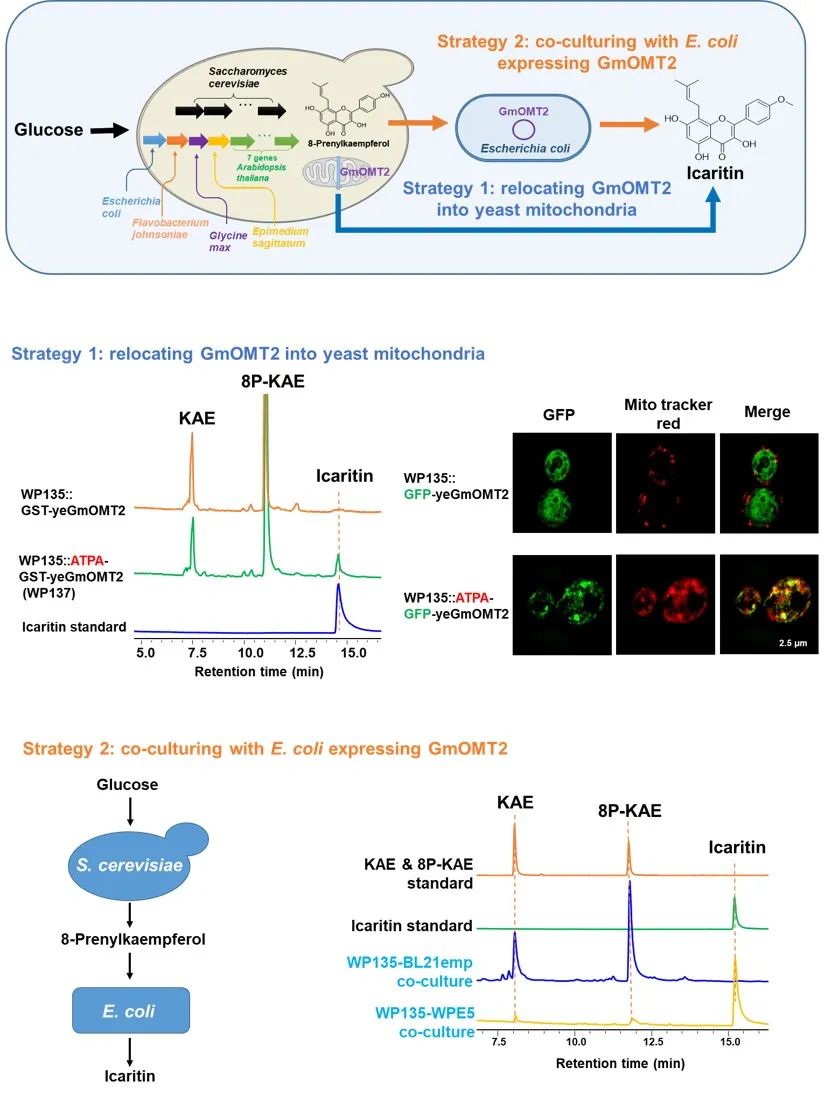
Herba epimedii (Epimedium), one of the Chinese traditional herb medicines, has a wide range for human health, tonifying kidney, strengthening muscles and bones, and preventing rheumatism. The main bioactive components of Epimedium plants are flavonoids, especially the prenylated flavonol glycosides at C8 position, such as icaritin, icariin and epimedin A/B/C. Among them, icaritin is also a single component of the commercial medicine 'Icaritin', a candidate drug for anti-liver cancer, which has completed phase III clinical trials.
Due to the decreasing supply of Epimedium wild resources and the increasing market demand, scientists have been trying to alleviate this outstanding conflict by synthesizing the active components of Epimedium in vitro, but the progress is relatively slow.
In this study, a previously unreported prenyltransferase (EsPT2) from Epimedium sagittatum and a previously uncharacterized methyltransferase (GmOMT2) from G. max has been identified and functionally characterized. The former catalyzed the C8 prenylation of kaempferol to produce 8-prenylkaempferol (8P-KAE), and the latter catalyzed the methylation of 8P-KAE at C4' position to yield icaritin.
By introducing 11 heterologous genes and modifying 12 native genes, a yeast strain capable of producing 8P-KAE with high efficiency was constructed.
Since the low pH in the yeast cells may suppress GmOMT2 activity, researchers proposed two strategies to solve this problem: by relocating GmOMT2 into mitochondria of the 8P-KAE-producing yeast cells; or using a co-culture system that achieved an icaritin level of 19.7 mg/L with glucose as the substrate by dividing the synthetic pathway into Saccharomyces cerevisiae and Escherichia coli.
Researchers also illustrated how the strategies worked by exploring organelle localization, and utilizing two host species to overcome the widespread issue of pH mediated incompatibility of heterogonous enzymes and eukaryotic chasses encountered in basic and applied biology research.
These findings will enable the realization of industrial-scale production of icaritin and further engineering to produce icaritin derivatives.
This study entitled "Complete biosynthesis of the potential medicine icaritin by engineered Saccharomyces cerevisiae and Escherichia coli" has been recently published in Science Bulletin.
The study was supported by the funds of the National key R & D Program, the National Natural Science Foundation and the Strategic Priority Research of the Chinese Academy of Sciences.

Complete biosynthesis of the potential medicine icaritin in engineered yeast and bacterium (Image by HUANG Wenjun)
YAN Xing; WANG Ying; ZHOU Zhihua
E-mail: yanxing@sibs.ac.cn; yingwang@scib.ac.cn; zhouzhihua@sippe.ac.cn.

86-10-68597521 (day)
86-10-68597289 (night)

52 Sanlihe Rd., Xicheng District,
Beijing, China (100864)

